

Apollonius of Rhodes. Ancient Greek epic poet Apollonius of Rhodes (Ancient Greek: Ἀπολλώνιος Ῥόδιος Apollṓnios Rhódios; Latin: Apollonius Rhodius; fl. first half of 3rd century BCE), was an ancient Greek author, best known for the Argonautica, an epic poem about Jason and the Argonauts and their quest for the Golden Fleece.
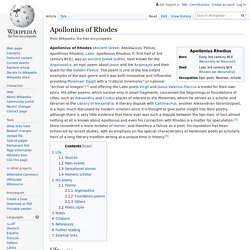
The poem is one of the few extant examples of the epic genre and it was both innovative and influential, providing Ptolemaic Egypt with a "cultural mnemonic" or national "archive of images",[1] and offering the Latin poets Virgil and Gaius Valerius Flaccus a model for their own epics. His other poems, which survive only in small fragments, concerned the beginnings or foundations of cities, such as Alexandria and Cnidus places of interest to the Ptolemies, whom he served as a scholar and librarian at the Library of Alexandria. Life[edit] Sources[edit] The most reliable information we have about ancient poets is largely drawn from their own works.
Main events[edit] Birth. Pelias. Pelias, king of Iolcos, stops on the steps of a temple as he recognises young Jason by his missing sandal; Roman fresco from Pompeii, 1st century AD.
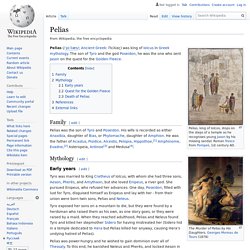
Pagasae. Map showing ancient Thessaly.
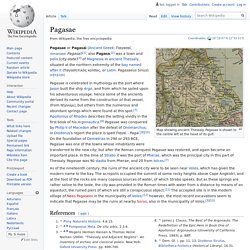
Pagasae is shown to the centre left at the head of its gulf. Iolcus. Place in Greece Mythology[edit] Pelias sends forth Jason, in an 1879 illustration from Stories from the Greek Tragedians by Alfred Church.
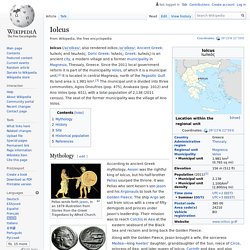
Coin (Chalkous) of Iolcus. 4th century BC. Obverse: Head of Artemis Iolkia. Phrixus. Ancient Greek mythological figure Mythology[edit] Depiction of Phrixos flying on ram to Colchis on AE dichalkon struck in Halos, Phthiotis in 3rd century BC.
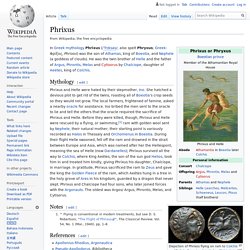
Notes[edit] ^ Flying is conventional in modern treatments, but see D. S. Arestor. Argus. From Wikipedia, the free encyclopedia Jump to navigationJump to search.
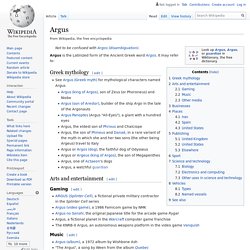
Pelias. Acastus. Ancient Greek mythological Argonaut Acastus (; Ancient Greek: Ἄκαστος) is a character in Greek mythology.
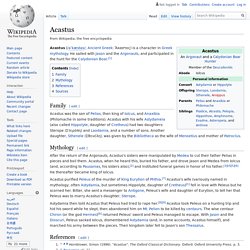
He sailed with Jason and the Argonauts, and participated in the hunt for the Calydonian Boar.[1] Family[edit] Mythology[edit] Astydamia then told Acastus that Peleus had tried to rape her.[8][9] Acastus took Peleus on a hunting trip and hid his sword while he slept, then abandoned him on Mt. Calais. Subprefecture and commune in Hauts-de-France, France Calais ( KAL-ay, kal-AY,[2][3] traditionally KAL-iss, French: [kalɛ] ( listen); Picard: Calés; Dutch: Kales) is a city and major ferry port in northern France in the department of Pas-de-Calais, of which it is a sub-prefecture.
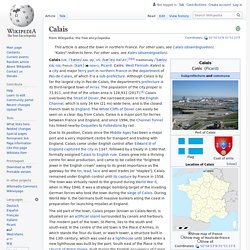
Although Calais is by far the largest city in Pas-de-Calais, the department's prefecture is its third-largest city of Arras. The population of the metropolitan area at the 2010 census was 126,395. Thrace. The Roman province of Thrace The Byzantine thema of Thrace.
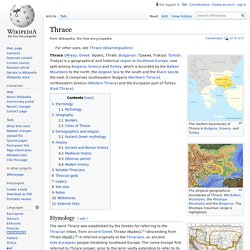
Orithyia. Boreas. Boreads. For the social fraternity nicknamed "Zetes", see Zeta Psi Calaïs et Zétès délivrent Phinée des Harpies by Bernard Picart The Boreads (Ancient Greek: Βορεάδαι) are the "wind brothers" in Greek mythology.
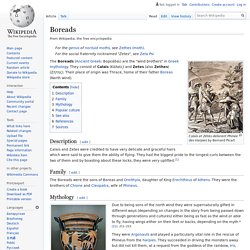
They consist of Calaïs (Κάλαϊς) and Zetes (also Zethes) (Ζήτης). Delphi. Archaeological site and town in Greece Delphi (; Greek: Δελφοί [ðelˈfi]),[1] formerly also called Pytho (Πυθώ), is the ancient sanctuary that grew rich as the seat of Pythia, the oracle who was consulted about important decisions throughout the ancient classical world. The ancient Greeks considered the centre of the world to be in Delphi, marked by the stone monument known as the omphalos (navel). Phocis. Regional unit in Central Greece, Greece Geography[edit] Modern Phocis has an area of 2120 km² (819 mi²), of which 560 km² (216 mi²) are forested, 36 km² (14 mi²) are plains, and the remainder is mountainous.[1] The massive ridge of Parnassus (2,459 m/8,068 ft), which traverses the heart of the country, divides it into two distinct portions. The neighbouring prefectures are Aetolia-Acarnania to the west, Phthiotis to the north and Boeotia to the east. Naubolus.
Genus of spiders Naubolus is a genus of South American jumping spiders that was first described by Eugène Louis Simon in 1901.[2] Species[edit] As of July 2019[update] it contains nine species, found in Paraguay, Argentina, Guyana, and Brazil:[1] Naubolus albopunctatus Mello-Leitão, 1943 – BrazilNaubolus melloleitaoi Caporiacco, 1947 – GuyanaNaubolus micans Simon, 1901 (type) – BrazilNaubolus pallidus Mello-Leitão, 1945 – ArgentinaNaubolus posticatus Simon, 1901 – BrazilNaubolus sawayai Soares & Camargo, 1948 – BrazilNaubolus simplex Mello-Leitão, 1946 – ParaguayNaubolus trifasciatus Mello-Leitão, 1927 – BrazilNaubolus tristis Mello-Leitão, 1922 – Brazil.
Iphitos. From Wikipedia, the free encyclopedia Jump to navigationJump to search Iphitos or Īphitus (; Ancient Greek: Ἴφιτος) is the name of six individuals in Greek mythology. Hephaestus. Hephaestus. Thestius. Iphiclus. Meleager. Oeneus. This article uses HTML markup. Please help by changing HTML markup to Wiki markup where appropriate. For help finding or replacing the problematic tags, see instructions. Oeneus. Laocoön.
Trojan priest in Greek and Roman mythology. Aetolia. Calydon. Oeneus. Meleager. Samos. Ancaeus. Miletus. Erginus. Santorini. Triton. Europa. Cape Matapan. Euphemus. Amphion. Pellene. Amphion. Helios. Elis. Augeas. Ancaeus. Cepheus (son of Aleus) Tegea. Arcadia. Aleus. Amphidamas. Pylos. Neleus. Periclymenus. Idas. Aromatic hydrocarbon. Aphareus of Messenia. Lynceus of Argos. Castor and Pollux. Sparta. Tyndareus. Leda. Castor and Pollux. Acheron. Abas. Idmon. Danaus. Poseidon. Nauplius. Nauplius. Talaus. Areius. Hylas. Labours of Hercules. Colchis. Alcmene. Zeus. Heracles. Laodocus. Argos. Pero. Bias. Talaus. Asopos. Dionysus. Phlias. Athena.
Siphae. Tiphys. Phalerus. Siren. Butes. Thetis. Hera. Achilles. Phthia. Peleus. Salamis Island. Aegina. Aeacus.